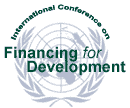
Department of Public Information - News and Media Services Division - New York
18-22 March 2002
 |
International
Conference on Financing for Development Department of Public Information - News and Media Services Division - New York |
|
| Monterrey, NL, Mexico 18-22 March 2002 |
22 March 2002 | |
|
|
|
At a joint press conference with European Commission President Romano Prodi, Mr. Aznar said the Conference had achieved consensus on three levels: an internal consensus within the European Union on official development assistance (ODA), a European Union consensus with the United States on ODA, and a consensus between donor and recipient countries. The Prime Minister, whose country holds the rotating European Union presidency, said the European Union contribution to development went slightly further than the Monterrey Consensus, but was fully in line with it. Those countries that had already achieved the agreed 0.37 per cent average ODA level should maintain it, and those that had not should aim for 0.39 per cent. He said discussions had reached consensus on the rule of law, equality of opportunity for men and women, openness to investment, greater liberalization of trade, as well as improvement in trade quantity and quality, and monitoring of results on the ground. Combating poverty and achieving development should not be aimed only at those who needed it most because that would exclude some countries, he added. Mr. Prodi said the Consensus had not started with the Monterrey Conference and would continue at the Johannesburg World Summit on Sustainable Development. Monterrey must be seen as a step in the direction of more sustainable development. The real question was how to gain the maximum development for the greatest number possible. Noting that Africa was not only Europe's neighbour, but also the continent most in need of development, he said the Commission would push education initiatives in that region. Asked his reaction to the summit statement by United States President George W. Bush, Mr. Aznar said he had approached the ODA issue from the right perspective, stating his concern to maintain the effectiveness of aid to the least developed countries. Mr. Prodi said the United States was heading in the right direction. Only a strong engagement between Europe, the United States and Japan could bring about a change in the effectiveness of ODA. Pointing out the contradiction between the European Union's stated commitment to opening its markets and its raising of barriers to steel, cereals and fruit juice, another correspondent asked whether that action would not hurt Brazil and other developing countries. Mr. Prodi replied that the action had nothing to do with developing countries, but was a purely bilateral decision. "We need to protect ourselves from the consequences of United States steel measures. It will last only as long as the United States measure lasts", he said. The Prime Minister said the European approach would be made clear at the Madrid Summit to be held in May between the Union and the Latin American and Caribbean countries. Asked if it was reasonable for poor countries to ask the wealthy nations to eliminate subsidies in exchange for an opening of markets, Mr. Aznar said it was not possible to take a fragmented view. You could not have development with closed markets, State intervention and lack of education. He noted that some countries had major natural and energy resources, but their development depended on other factors. "Spain was receiving ODA in 1981 and now we are among the top 10 donor countries, due, to a large extent, to institutional consolidation, democracy, education, Union membership and other factors", he added. Another journalist asked which developing countries were included in the European Union's "everything but arms" initiative. Would tariffs be removed for their goods? Mr. Prodi replied that the initiative involved the 49 poorest countries in the world, which would be exempt from tariffs on sugar, rice and bananas. Press Releases Conference News |